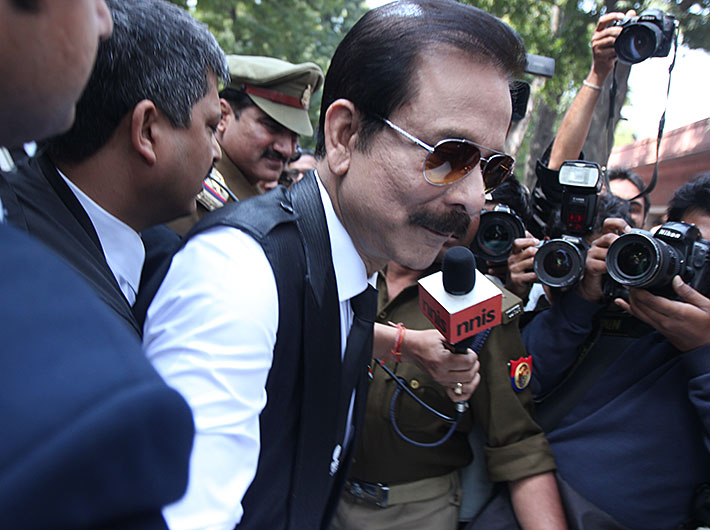With the ordinance granting special powers to Sebi to crack down on fraudulent schemes having lapsed recently, a hundred other bubbles are waiting to burst
Sahara chief Subrata Roy’s arrest, and subsequent judicial custody, ordered by supreme court came as a dramatic turn of events this week. Dramatic because this was one of those rare occasions when a corporate honcho, of the likes of Roy, is facing so much censure not just from the general public but from the authorities as well.
As the apex court order made it clear, none of those full-page newspaper adverts, television commercials, interviews and the mother-unwell excuse failed to do the wonders as the court stuck to its ground of demanding refund of the entire Rs 24,000 crore – deemed to have been raised illegally by two Sahara group companies.
Things could have been different today if the regulatory body, the securities and exchange board of India (Sebi) in this case, did not pursue the matter seriously enough.
This was a matter under Sebi's jurisdiction and so the regulatory body has been pursuing it seriously.
However, not every fraud related to illegal raising of funds falls under the ambit of Sebi or any other regulatory body, and in such a case of regulatory vacuum entities like Saradha, NSEL, Rose Valley and a million others evolve and flourish.
Undelivered notices and summons, untraceable addresses, delayed probe reports, criminals forever on the run, more gullible investors being duped and a million other entities yet to be cracked down – this is the growth story of the millions of fraudulent money-collection schemes running in India. And looking at the pace of measures being taken to check their growth, they are likely to continue flourishing even in future.
In February, the serious frauds investigation office (SFIO), which was to submit its probe report on the Rs 20,000-crore Saradha scam, operational in West Bengal and Odisha in December, sought an extension till March to submit its final report. According to its interim report, it is because of the regulatory vacuum and overlapping jurisdictions of multiple regulators in the country that entities get a chance to indulge in irregularities.
And keeping in mind the fact that ordinance granting special additional powers to Sebi to crack down on such schemes lapsed recently, Saradha is not likely to be our last crisis.
There are a million other similar bubbles waiting to burst. In fact, Sebi chairman UK Sinha had commented that the lapsing of the ordinance “will have implications”.
Special rules to crack down on irregularities, and its end
After the crackdown on Saradha in April last year, the Securities Laws (Amendment) Second Ordinance, 2013, was promulgated by the government in July 2013. This was about providing Sebi with more teeth to be able to quickly investigate matters without having to waste time in seeking approvals for searching and seizing premises, attaching properties and accessing call data records of alleged defaulters who illegally raised public funds over Rs 100 crore.
In August last year, the Sebi board formed an action plan to make use of the new powers, and regulations were drafted to make use of these powers. After parliament failed to pass the Bill during the winter session (December), the markets watchdog notified new regulations based on the ordinance. The ordinance finally lapsed in January and we are back to square one.
During the period when the ordinance was valid, Sebi issued orders for attaching properties in about 60 cases to recover almost Rs 2,000 crore raised by these entities illegally. Now, with the ordinance having lapsed, and the Bill still stuck in parliament, while Sebi will not have to recall these orders it will not be able to pass more such orders for making recoveries. This would, thus, give fraudsters more time and freedom to make fortunes at the expense of gullible investors.
And this is not just the story of one regulator – almost all of them have to work virtually under the shadows of lawmakers. As they say with power and money, the more you have, the greedier you get. And that, experts say, is how our political system likes it. Any possibility of making the regulatory agencies powerful is a scary proposition for them, as it means doing away with some of their powers, with which a lot of norms have been brazenly violated.
Many analysts argue that the Bill got stuck in parliament because several politicians, cutting across party lines, had opposed it. They contended that it was unhealthy and risky for the entire system if one regulatory body is given such powers.
By that logic it is all right to put the system at risk by allowing more freedom to fraudulent corporate entities to continue manipulating the system for vested interests but is more risky for a regulatory body to be given additional powers to check such unscrupulous activities.
Risky for the system or risky for them is a debate which begs immediate attention but one thing is clear: given the rise of frauds in the country, our regulatory authorities need to be trusted with more powers to ensure that they don’t have to waste time arguing about jurisdictions and awaiting search, seizure and attachment orders from a magistrate.
The public doesn’t need its politicos to be all sympathetic after a crisis has done severe damage and then go about handing compensatory cheques for damage control the way West Bengal chief minister Mamata Banerjee handled the Saradha fiasco in West Bengal. It instead needs it politicians to allow regulators to function without any hiccups to ensure that the damage is controlled much before it unsettles the entire system of things.

